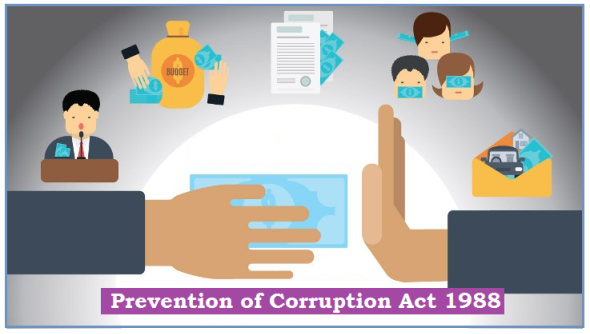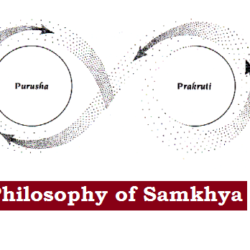
The Prevention of Corruption Act, 1988 (PC Act) was enacted to prevent corruption in Government departments and to prosecute and punish public servants involved in corrupt practices. The Prevention of Corruption Act extends to the whole of India and it applies also to all citizens of India outside India.
Public servant, normally, is any person in the service or pay of the Government or remunerated by the Government by fees or commission for the performance of any public duty. The Acts widens the scope of the definition of the expression “public servant”, incorporation of offences under sections 161 to 165-A of the Indian Penal Code.
The Amendment Act, 2018 came to enhance transparency and accountability of the government and make anti-graft provisions under the law stringent. It was attempted to bring the Act in line with
United Nations Convention against Corruption 2005, which was ratified by India in 2011.
| Table of contents |
| 1. Salient Features of the Act 2. Corruption Perception Index 2023 3. Important Sections of the Act 4. Other Important Laws against Corruption 5. Questions from CGPSC Mains Examinations |
Salient Features of the Act
Judicial Structure:
- The Govt (Central and State) is empowered to appoint Special Judges to try certain punishable offences.
- The qualification for the Special Judge is that he should be or should have been a Session/ Additional/ Assistant Judge.
- The Special Judge has to hold the trial of an offence on day-to-day basis and endeavours to conclude the trial within a period of two years. This period can be extended by 6 months at a
time and up to a maximum of 4 years in aggregate subject to proper reasons for the same being recorded. - Every criminal trial has to follow certain procedural rules which are provided in the Code of Criminal Procedure, 1973.
Investigation:
- Investigation shall be done by a police officer without the order of a Metropolitan Magistrate or a magistrate of first class, or make any arrest therefore without a warrant, not below the rank of:
- In case of Delhi, of an Inspector of Police.
- In metropolitan areas, of an Assistant Commissioner of Police.
- Elsewhere, of a Deputy Superintendent of Police
- If a police officer not below the rank of an Inspector of Police is authorized by the State Government in this behalf by general or special order, he may investigate such offence.
Offences and Penalties:
- The offences under the Act shall be punishable with imprisonment which shall be not less than 3 years, but which may extend to 7 years and shall also be liable to fine. The offences include
- Taking gratification other than legal remuneration,
- Public servant obtaining valuable things
- The bill redefines provisions related to criminal misconduct to only cover two types of offences viz. illicit enrichment (such as amassing of assets disproportionate to one’s known income sources) and fraudulent misappropriation of property.
- For committing criminal misconduct, shall be punishable with imprisonment for a term which shall be not less than one year, but which may extend to 7 years and shall also be liable to fine.
- The offence of ‘giving a bribe’ by any person or corporate organization as direct offence punishable with imprisonment for maximum of 7 (seven) years.
- It also introduces powers and procedures for attachment and forfeiture of property of public servants procured by means of an offence.
Prior Approval for Investigation and prosecution:
- It protects officers from any enquiry or investigation by the police before prior approval.
- No Court shall take cognizance of an offence punishable except with the previous sanction,
- However, such approval will be not necessary in cases that involve arrest of person on spot on charge of taking a bribe.
- The competent authority has to convey its decision within 3 months.
| Corruption Perception Index 2023 |
| 1. The Corruption Perceptions Index (CPI) is an index published annually by Transparency International since 1995 which ranks countries “by their perceived levels of public sector corruption, as determined by expert assessments and opinion surveys. 2. The CPI generally defines corruption as “the misuse of public power for private benefit”. The global average score is stuck at only 43, while the vast majority of countries have made no progress or declined in the last decade. 3. Denmark (Score 90), Finland (87) and New Zealand (85) are the top scorers, while Somalia (11), Venezuela (13), Syria (13) and South Sudan (13) are the highest corrupt countries out of 180 countries. 4. India (39) was ranked 93 with that of Ghana, Kuwait, Turkey, etc. 5. Indias’s neighbors: China ranked 76, Sri Lanka ranked 115, Pakistan ranked 133, Bangladesh ranked 149 |
Important Sections of the Act
| Sections | Provisions |
| Section 7/8 | Offence relating to public servant being bribed |
| Section 11 | Public servant obtaining undue advantage |
| Section 13 | Criminal misconduct by a public servant |
| Section 17 | Persons authorized to investigate Section 17A: Prior approval for investigation of offences relatable to recommendations made or decision taken |
| Section 18A | Attachment or confiscation of money or property procured by means of an offence |
Other Important Laws against Corruption
The Prevention of Money Laundering Act, 2002
Money Laundering refers to the conversion or misrepresentation of money which has been illegally obtained by unlawful sources and methods. It is a criminal offence in India.
Foreign Exchange Management Act, 1999
It provides the legal framework for the administration of foreign exchange transactions in India.
| Directorate of Enforcement (ED) |
| The Directorate of Enforcement (ED) is a multi-disciplinary organization mandated with investigation of offences of money laundering and violations of foreign exchange laws. It functions under the Department of Revenue of the Ministry of Finance. |
Lokpal and Lokayukta Act, 2013
It provides for the establishment of Lokpal for the Union and Lokayukta for States. They perform the function of an “ombudsman” and inquire into allegations of corruption against certain public functionaries and for related matters.
Prohibition of Benami Property Transaction Act, 1988
was enacted for the purpose of preventing and restricting Benami transactions and right to recovery of Benami property and otherwise any transaction.
| Questions from CGPSC Mains Examinations |
| 2022 Define ‘Public Servant’ under the Prevention of Corruption Act 1988. (8 marks) भ्रष्टाचार निवारण अधिनियम 1988 के अंतर्गत ‘लोक सेवक’ को परिभाषित कीजिये। (8 अंक) |
| 2021 When will a person be qualified for appointment as a special judge under the Prevention of Corruption Act 1988? (02 marks) भ्रष्टाचार निवारण अधिनियम 1988 के अंतर्गत विशेष न्यायधीश के रूप मे नियुक्ति हेतु कोई व्यक्ति कब अर्हित होगा? (02 अंक) |

 Home
Home Syllabus
Syllabus Contact Us
Contact Us




